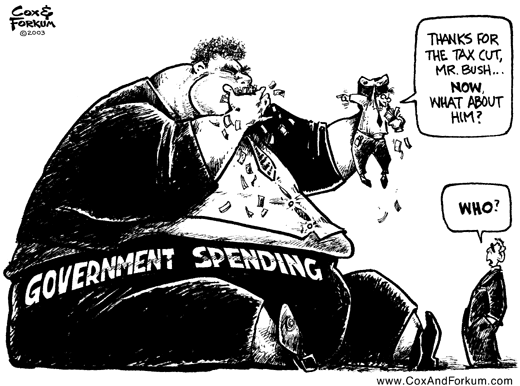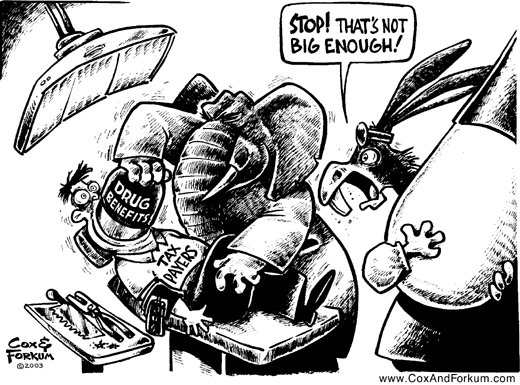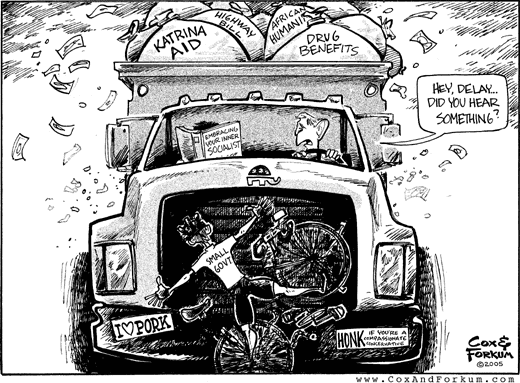Bruce Bartlett: Bush Is An Imposter
No, not body snatcher imposter, but an imposter in terms of being a conservative. I have been feeling this way about Bush for quite some time now. Bush’s first reaction to any problem is to turn toward government. Government is what has brought about the new jobs he has been bragging about (and frankly it ain’t much to brag about, IMO). When it came to education, instead of getting government out of the way Bush shoved government even further into the picture, and in a way that may not be helping all that much. Then there is that gigantic atrocity known as the Medicare Prescription Drug Program, or as I like to call, the Black Hole. When in doubt George W. Bush’s first instinct is to turn to government for the answer and to make government bigger. In short, President Bush is an activist for bigger more intrusive government.

I know I’ll get many of the rightward leaning readers of this blog responding with lots of “Yeah, buts…” or “No, your wrong because….” The problem is that I’m not wrong. Consider the Medicare Trustees annual report that gave a projected cost Bush’s Medicare Drug Program of over $10.8 trillion.

So any attempt to point to Bush’s plans to overhaul Social Security pale in comparison I’m afraid. Bush doesn’t look at government with skepticism or distrust, but with the idea that if we just get it right it will work. This, Bartlett argues, is very much the mindset of a Democrat not a Republican (at least in the mold of Reagan) and certainly not in line with small ‘c’ conservativism.
Bartlett also advances the argument that Bush’s Medicare Drug Program will pave the way for price controls on prescription drugs. The problem is that the program will lead to an explosion in the federal budget and that the best and fastest way to control that explosion will be price controls.
But in the longer run, it is inevitable that price controls will be imposed on drugs. Realistically, it will be the only way that exploding costs can be controlled quickly. Indeed, some new cancer drugs now cost $100,000 for a single course of treatment. There is no way that taxpayers will be able to afford that expense. That is why virtually every other industrialized country substantially controls the prices of most prescription drugs. It is also the reason why Canada sells the same drugs available here for lower prices.
So, Bush is setting the stage for even further intrusion by the government into the economy. On top of it as most people will realize right away, price controls come with many problems. Reducing the profitability of any commodity will reduce its supply. This isn’t some sort of fancy highly mathematical economic theory, but a result of the simplest most accepted model in economics (basic supply and demand) as well as plenty of empirical evidence (gasoline price controls anyone?). So Bush is setting the stage for fewer and fewer new drugs to address health problems on top of his expansion of government like nothing we have seen in the last 20 years or more.
And the Medicare Drug Program isn’t the only example. As already mentioned there is the educational program, No Child Left Behind. Then there was the pork riddled energy bill, and then the pork filled highway bill with bridges to nowhere. Bartlett notes that pork barrel spending under Bush went from 6,333 projects totalling $18.5 billion to 13,999 projects totalling $27.3 billion a 50% increase!

By comparison Bill Clinton is a paragon of spending restraint and fiscal responsibility. Granted, Clinton early on wanted to also expand government to an unprecedented level, but back then Republicans and conservatives either believed in ideals of smaller government or cynically used them to short stop Clinton’s proposal. Based on the behavior of the Republican party these past 5 or so years, I’m inclined to believe in the latter.
Other than cutting taxes and the war in Iraq and on terrorism, President Bush is a liberal. That is the bottom line. Calling Bush a conservative is, in my opinion, an insult to conservatives.






This is no surprise. As I wrote two years ago:
[My blog’s archives are deleted, so the link is to it being quoted elsewhere.]
Steve,
One difference between Bush and Democrats when it comes to the size of government is that Democrats actually believe that government is important to helping people and therefore it is important that the government be able to do what it promises, by my account you cannot say this about Bush. If he really believed in a bigger government, he would try to staff it with competent people who are familiar with the area rather than appointees who are politically connected. (Mike Brown at FEMA is only one example.)
So in fact Bush is even worse than your post would suggest: he is increasing government because he believes it is politically convenient, but doesn’t back it up with the necessary follow thru to make it effective. (Both the Medicare program and NCLB are examples of this — regardless of what you think about the merits of these programs, do you honestly think that these programs would have as many problems as they have had if they had been rolled out by the last administration.) The current administrationÂ’s path is the worst of both worlds — bigger government without greater competence.
SoloD has the left’s view pretty much right: The only reason big government doesn’t work better than it does, is because the right people haven’t been running it.
And McGhee seems to have the right’s view: Government can’t ever work*.
But that isn’t particularly germane to this post, since it a GOP President and a GOP Congress that are running up the size of government. The better question is why if Bush believes that these programs are important he has done such a poor job of implementing them.
(*”morality issues” excepted, of course)
Nobody with a brain has ever thought Bush a “conservative”–it totally flys in the face of his entire career.
Remember, before becoming Governor of Texas, he was brought in as an owner of the Texas Rangers to negotiate a deal with the city of Arlington that basically gave them a free stadium and dispossessed numerous land owners through eminent domain.
Without the city’s subsidy, he never would have been able to leverage his $600,000 investment into the $14 million windfall that funded his Crawford estate.
When he was running for President in 2000, his main issue was education–something the Feds have no business being involved in.
You failed to mention, Steve, his Wilsonian foreign policy that totally counters conservative, realist thinking.
Its funny, however, how Republicans tend to be more liberal, big-government types than Democrats. Outside of Bush, the Nixon was one of the big supporters of govnermntal expansion–typified in his environmental and drug policies.
Bhoe,
Yep, Bartlett nails Nixon on that as well arguing he was really a liberal.
great article steve, now you know you should have voted for alan keyes like the smart voters did!
Oh, the right realizes that the government works — it just doesn’t work well. And 99 percent of what it does is what nobody ever really wanted it to do in the first place.
As for morality issues — am I to understand, Solo, that you don’t consider “hate crime” laws and the like, to be attempts to legislate morality?
How can Bush be a liberal, he believes in God? How do you say it, hate the player cause you can’t do sh-t about the game. Bush is just to cool for you to handle, got too much backbone, I think he’s the daddy you always wish you had. He’s smarter then all of you put together, and so is anyone on his staff. Your feeble attacks are not making this much fun any more, they’re just silly. Come on, make somthing good up, I know you guys got skills for that, Dang’ its all you do.
Wonder what the 1% of government that McGhee want is… Could it be national defense? How about road construction & maint? Who needs the CDC? Shut it down. disease does not scare him.
A social services net? Nope, shut it down, when poor people start to rob & loot in wealthier neighborhoods out of desperation, McGhee will just call the police who’s services he does not want who will turn criminals over to the justice system he does not want or need.
Well, I could go on, but don’t really want to waste more pixels on someone who is talking out of his hat…
I don’t care if Bush is a libeal or conservative, I would rather have Bush in charge before having any Democrat as the guy in charge of our nations securty. If Gore or Kerry were President on 9/11, OBL would have demolished more cities and killed more people in additional terror attacks.
I will agree with you Steve on the Medicare Part D prescription Plan. It is a total disaster. More less fortunate citizens will go without the drugs they need to maintain their health due to Plan D. Plan D will also increase the Medicare costs due to people not being able to afford the drugs causing medicare patients to have more Doctor and Hospital visits for problems caused from not having the drugs they need.
The Prescription Drug Plan should be scrapped completely
I don’t know anyone who voted for Bush because they liked him or were inspired by his vision. They voted for him because he wasn’t Gore/Kerry, which is, after all, a powerful argument.
I think the second Cox & Forkum cartoon got it right.
Ainjin-san, you are attacking a straw man. I don’t know any conservatives who have a problem with law enforcement, national defense, or even the CDC. I don’t know any conservatives who want to leave the poor to rot; however, they don’t believe government is an effective institution for addressing poverty, a view with considerable theoretical and empirical justification. Maybe you have conservatives confused with anarcho-capitalists?
The only problem with this for anjin-san is reality. For the first 130 or so years there was no “social safety net” (at least via the federal government) and there was precious little rioting and looting by the poor.
Basically what Kent said. I don’t want to see the poor suffer, at the same time I want to get the government out of their way so they can hopefully have a better life. Heck, I’d be happier if we shut down many of the “social safety net” institutions and simply had the U.S. Treasurey send them a check. Take the budget for these progrmas, divide it by the number of poor and send every poor person a check for that amount. Sure, it is a pure income transfer, but I think it’d be better than what we have now.
Steve,
Actually thats not such a bad idea. As for government getting out of the way, I have a relative who is severley handicapped. We provide a lot of her care, and a governement program provides for most of her housing expenses. What will she do when government gets out of her way?
Another point, for the first 130 years of our courntries existance there were a lot less people in it then there are now…
I wonder when Republicans are going to realize George Bush doesn’t like them any more than he likes Democrats…
Well if we went with my idea of sending checks, she could pay for her own housing.
Oh…okay, so it is poor and lots of people. Any other hidden assumptions you’d like to share. Not that I see how this helps your arguement any.
Wouldn’t fewer people mean less money to go around, because of a smaller tax base and fewer charitable contributions? I don’t see how that bolsters your case any.
Bruce Bartlett thinks that Bush is not a Reagan Conservative.
Well, I’m looking at the Treasury’s graph of debt-to-gdp ratio 1950-2004, and they look like peas in a pod to me.
In 1950 that ratio stood at 90% from WWII. Every president from Truman through Carter reduced that ratio in an almost linear fashion down to 33%.
In the 12 Reagan Bush I years 1980-1992 that ratio grew linearly to 68%. Clinton got it down to 54% in his 8 years, and in only 4 years Bush II got it back to 68% and still climbing.
All three seem to have a fiscal policy of bankrupting the country.
The Laffer curve of Supply Side economics is a joke (hence its name, Laugher Curve).
The real lesson here is that tax cuts wreck us economically unless you are willing to cut spending. But neither party will do that.
At least the Dems are honest enough to raise taxes to pay for what the people want. The GOP prefers to use a credit card that will hit the next few generations with the debt they rang up.
Tax and spend Dems are preferable to borrow and spend GOP’s.
Dear Mr. Barlett,
I enjoyed hear your interview on NPR’s “Fresh Air.”
You said that you were very surprised that a public debate did not begin soon after the 2004 election, once President BushÂ’s reelection was not at risk, about the future direction of the Republican Party, and that it is a mystery to you why more people arenÂ’t saying publicly the things that you are saying now.
I think that the reason for this is something that you hardly hear anyone talk about – our system of voting.
With our current voting system, you simply vote for either Kerry or Bush, taking the last election as an example. If you do not like either candidate, you can either vote for a third party candidate and risk splitting the vote and allowing the candidate you hate the most to win, or you do not vote at all.
This either-or situation not only affects the way people vote, but it has a dramatic effect on the campaigns and discussions that precede elections. I believe that the reason for the lack of widespread open discussion among Republicans about the topics discussed in your book is because Republicans fear that airing these views may inspire another Ross Perot-like third party candidate, despite the fact that Ross Perot was in fact successful at bringing attention to overspending in government. I believe that Republicans fear this because Ross Perot is believed by some to be responsible for Bill Clinton winning two elections with less than a majority of the vote.
Note the perversity of this situation: people who agree with your viewpoints dread the emergence of a candidate that shares those viewpoints. And not only do they discourage those candidates from running, they discourage discussions of those views even four years before an election because it may lead to such a candidacy.
If we were to use a voting system that allows us to indicate our favorite candidate and our second choice candidate on the same ballot, I believe the discussion would be wide open. Under that system, used in Ireland and Australia for centuries and called Instant Runoff Voting (IRV), if your favorite candidate turns out to be a long shot, your vote goes to your next choice. Under this system, the winner would need the support of a majority (more than 50%) of the voters.
With IRV, a candidate may emerge whose views are aligned with yours, and you would feel free to vote for that candidate if you wish, even if they have only modest support, because you could still state your preference for Bush over Kerry. Republicans could freely and openly discuss the merits of Bush as a conservative without the fear that they are helping to elect a Democrat. I feel that with this system, we would also have better quality candidates and thus more accountable elected officials on both sides because they would have to face the very real threat of challengers if they betray their partyÂ’s values.
IRV is used by the Utah Republican party to elect its party leaders, and in the capitol, the Republican Party used a type of IRV for electing its House majority leader, John Boehner. Many cities are adopting IRV to elect their local officials. You can find more information about IRV at http://www.fairvote.org.
I hope you will consider the impact of our voting system on the discussions surrounding your book and on the exchange of ideas in this country in general.